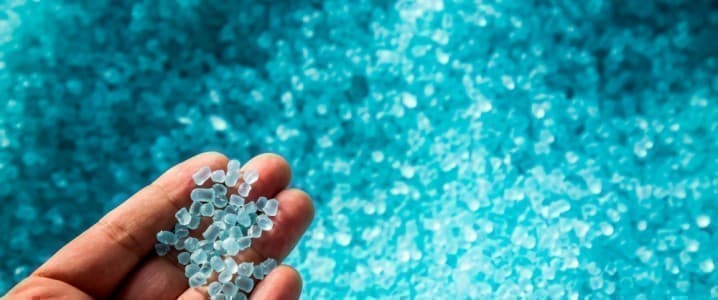The world is awash in waste plastic. Wind blows it across everyone’s property. Its value is so low that no good program exists to drive the recycling effort past 10%.
Although many Americans dutifully deposit their plastic trash into the appropriate bins each week, many of those materials, including flexible films, multilayer materials and a lot of colored plastics, are not recyclable using conventional mechanical recycling methods.
In the end, only about 9 percent of plastic in the United States is ever reused, often in low-value products. With a new technique, however, University of Wisconsin-Madison chemical engineers are turning low-value waste plastic into high-value products.
The new method, described in the Aug. 11, 2023 issue of the journal Science, could increase the economic incentives for plastic recycling and open a door to recycling new types of plastic. The researchers estimate their methods could also reduce greenhouse gas emissions from the conventional production of these industrial chemicals by roughly 60 percent.
The new technique relies on a couple of existing chemical processing techniques. The first is pyrolysis, in which plastics are heated to high temperatures in an oxygen-free environment. The result is pyrolysis oil, a liquid mix of various compounds. Pyrolysis oil contains large amounts of olefins – a class of simple hydrocarbons that are a central building block of today’s chemicals and polymers, including various types of polyesters, surfactants, alcohols and carboxylic acids.
In current energy-intensive processes like steam cracking, chemical manufacturers produce olefins by subjecting petroleum to extremely high heat and pressure. In this new process, the UW-Madison team recovers olefins from pyrolysis oil and uses them in a much less energy-intensive chemical process called homogenous hydroformylation catalysis. This process converts olefins into aldehydes, which can then be further reduced into important industrial alcohols.
“These products can be used to make a wide range of materials that are higher value,” said George Huber, a professor of chemical and biological engineering who led the work alongside postdoctoral researcher Houqian Li and PhD student Jiayang Wu.
These higher-value materials include ingredients used to make soaps and cleaners, as well as other more useful polymers.
“We’re really excited about the implications of this technology,” said Huber, who also directs the Department of Energy-funded Center for the Chemical Upcycling of Waste Plastics. “It’s a platform technology to upgrade plastic waste using hydroformylation chemistry.”
The recycling industry could adopt the process soon; in recent years, at least 10 large chemical companies have built or announced plans for facilities to produce pyrolysis oils from waste plastics. Many of them run the pyrolysis oil through steam crackers to produce low-value compounds. The new chemical recycling technique could provide a more sustainable and lucrative way to use those oils.
Li explained, “Currently, these companies don’t have a really good approach to upgrade the pyrolysis oil. In this case, we can get high-value alcohols worth $1,200 to $6,000 per ton from waste plastics, which are only worth about $100 per ton. In addition, this process uses existing technology and techniques. It’s relatively easy to scale up.”
Huber noted the study was a collaborative effort across a few different UW-Madison departments. Clark Landis, chair of the Department of Chemistry and a world expert on hydroformylation, suggested the possibility of applying the technique to pyrolysis oils. Chemical and biological engineering Professor Manos Mavarikakis used advanced modeling to provide molecular-level insight into the chemical processes. And chemical and biological engineering Professor Victor Zavala provided help analyzing the economics of the technique and the life cycle of the plastic waste.
The next step for the team is to tune the process and better understand what recycled plastics and catalyst combinations produce which final chemical products.
“There are so many different products and so many routes we can pursue with this platform technology,” said Huber. “There’s a huge market for the products we’re making. I think it really could change the plastic recycling industry.”
***
One hopes the professor’s view comes true. The mess, annoyance , pollution and damage due to plastic waste in the environment is a fast growing problem. There are even early of research efforts showing tiny bit of plastic accumulating in our bodies – to effects not yet fully understood.
Plastics are wonderful materials, no doubt and fully proven. No one with any sense is opposed to their use. But the growth of the market and vast array of uses that has spread the refuse across the planet is becoming a monster that would be dealt with better sooner than later.
By Brian Westenhaus via New Energy and Fuel
More Top Reads From Oilprice.com:
- UK Oil Boiler Ban Sparks Debate
- Oil Prices Under Pressure As China's Economic Woes Worsen
- Russia's Rouble Crisis: Central Bank Hikes Rates To 12%


















